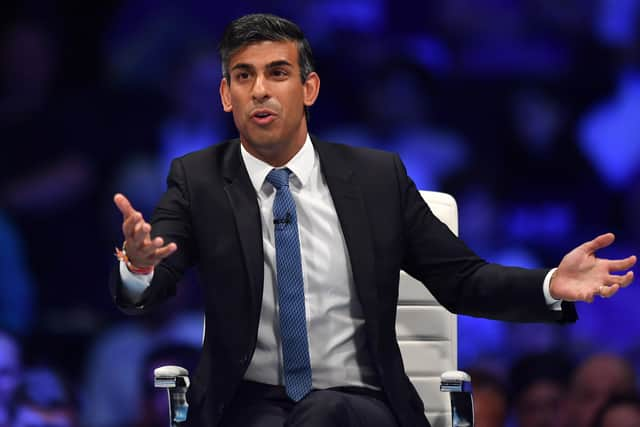Owen Polley: Rishi Sunak reveals how the UK pandered to the panic over Covid


The Conservative leadership candidate gave an interview to The Spectator magazine, alleging that arguments against lockdown were dismissed without proper exploration or evidence, at the height of the Covid panic.
The former chancellor’s comments are not necessarily relevant to his current political battle with Liz Truss.
Advertisement
Hide AdAdvertisement
Hide AdHe claimed that he was shocked and dismayed by the way government was handled during the pandemic. But he was one of a privileged ‘quad’, composed of three senior ministers and the prime minister, Boris Johnson, that took decisions without consultation with the full cabinet.
Ms Truss, who was trade secretary at the time, was not part of this group.
It is important, though, that Mr Sunak has given us an insight into the way that one set of opinions, championed by a particular group of experts, was presented as ‘the science’ and turned into an orthodoxy that could barely be questioned. We know now that lockdown was a risky policy that created a lot of potential harm. Some of its after-effects are already becoming obvious.
The Daily Telegraph recently reported that more than 1,000 extra people are now dying weekly from causes other than Covid. This is a rise in excess deaths of 14.4%, which suggests that non-Covid health conditions were neglected during the pandemic.
Advertisement
Hide AdAdvertisement
Hide AdSome of the most profound post-coronavirus problems have been experienced by young people, who missed out on almost two years of education in the classroom. The pupils who received their GCSEs and A Levels recently achieved their results against a very unusual backdrop.
‘Generation Covid’ is reportedly now suffering an epidemic of mental health problems. Meanwhile, hospitals continue to struggle with an upsurge in alcohol and drug related ailments, which have persisted since coronavirus restrictions were in place.
Then there are the effects of closing the economy, which we are only starting to experience, but could go on for decades. The mental and physical consequences of poverty could yet far outweigh the direct damage to our health caused by the disease and the pressures it exerted on the health system.
It was immediately obvious that lockdown was a complicated policy that necessitated carefully balanced ‘trade offs’ and the consideration of a broad range of evidence.
Advertisement
Hide AdAdvertisement
Hide AdFrom Sunak’s interview, though, it seems that the government failed to examine the possible unintended consequences of its policies, or even acknowledge properly that they existed.
“I wasn’t allowed to talk about the trade-offs,” he told the Spectator. “The script was not to ... acknowledge (that there could be side effects). The script was: there’s no trade off, because doing this for our health is good for the economy.”
The former chancellor admitted that, while public criticisms of the policy were muted, an open discussion did not take place in government either.
The emerging orthdoxy of one set of scientists, concerned with public health and epidemiology, was allowed to prevail unquestioned, while contrary evidence, not to mention evidence concerned with education, the economy and other aspects of society, was ignored.
Advertisement
Hide AdAdvertisement
Hide AdThese revelations are all too predictable, for those of us who thought that hysteria and group-think were at work at the time. It was clear that the coronavirus was a dangerous, unknown disease that justified a serious and maybe even an unprecedented response. At the same time, when the pandemic struck, anyone who suggested that we should take into account the importance of the economy, or education, or social interactions, or personal freedoms, was dismissed as either callous or a ‘Covid denier’.
Nuance was regarded, for a time, as dangerous, while politicians and other worthy public figures competed to show their devotion to the new gospel of lockdown.
Sunak’s interview suggested that this attitude was shared in the very highest echelons of government. Sources from within the cabinet now imply that Dominic Cummings, who at the time was Boris Johnson’s chief aide, was among the fiercest enforcers of the lockdown ideology. Mr Cummings wrote a blog that described government as something like managing a corporation. He often expressed his contempt for “the people at the apex of political power” and argued that scientists should shape government policy.
Unfortunately, in practice, this involved replacing discussions in cabinet with diktat by what one insider calls a “powerful clique” of scientists, who refused to consider the wider implications of their policy recommendations.
Advertisement
Hide AdAdvertisement
Hide AdLife has largely returned to normal now, and we know much more about treating Covid and vaccinating against the disease, so does any of this matter?
I believe it does. We don’t just have to guard against the threat of another lockdown, if a bad flu season or a different pandemic emerges. The tendency to silence dissenting voices and debate, at times of emergency, is also a menace to our democracy.